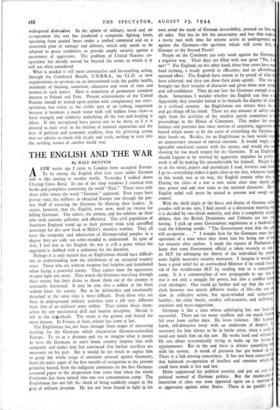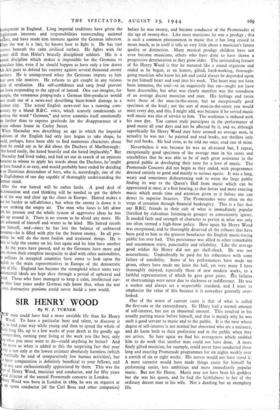THE ENGLISH AND THE WAR
By RALF HENTOM
AFEW weeks ago I came to London from occupied Europe. To be among the English after four years under German rule is like coming to another world. Yesterday I walked down Charing Cross Road. In one of the shop windows I counted nine books and pamphlets containing the word "Nazi." There were only three titles where the word " German " appeared. Four years have passed since the millions in occupied Europe saw through the pre- war bluff of excusing the Germans by blaming their leaders. It seems, however, that tit.: English, even now, need an excuse for killing Germans. The sailors, the airmen, and the soldiers do their jobs with extreme gallantry and efficiency. The civil population of Southern England stand up to their present trials with unruffled contempt for this new freak of Hitler's intuitive warfare. They all have the sympathy and admiration of German-ruled peoples in a degree they are only too sober-minded to understand. In spite of that, I feel that to the English the wai is still a game where the opponent is dubbed with a nickname for the duration.
Perhaps it is only natural that an Englishman should have difficul- ties in understanding how the inhabitants of an occupied country react. Those who are without weapons feel helpless and humiliated when facing a powerful enemy. They cannot meet the oppressors in open fight any more. 'They watch the Germans marching through their streets, but their desire to throw them out of the country is constantly frustrated. It may be true that a soldier at the front seldom hates the enemy. But to be defenceless and emotionally detached at the same time is more difficult. Even those who are busy in underground military activities have a job very different from that of an ordinary army soldier. They cannot brace them- selves by any mechanised drill and routine discipline. Morale is left to the individuals. The strain is the greater and hatred the more intense. In France, at least, release has come at last.
The Englishman has, not been through those stages of increasing loathing for the Germans which characterise German-controlled Europe,- To sit at a distance and try to imagine what it means to have the Germans in one's home country inspires him with sympathy and makes him feel convinced that further sacrifices are necessary on his part. But it would be too much to expect him to grasp the whole range of emotions aroused against Germany, from the naive anger of the first months of occupation to the present primitive hatred, from the indignant comments on the first German- censored paper to the desperation four years later when the whole Contine'nt has been turned into one vast concentration camp. The Englishman has not felt thz shock of being suddenly caught in the grip of military invasion. He has not been forced to fight in his own mind the myth of German invincibility, pressed on him all sides. Nor has he felt the uncertainty and fear that make a hectic race with time for anyone active in underground against the Germans—the question which will come first, Gestapo or the Second Front?
People on the Continent can only work against the Germans a negative way. Their days are filled with one great "No, I not!" For England, on the other hand, these four years have in hard training, a steady growth in efficiency, and an all-embra national effort. The English have reason to be proud of what have achieved, and they can show their pride openly. The war brought out their tenacity of character and given them new str and self-confidence. They do not fear the Germans enough to them. Sometimes I wonder whether the English can hate at Apparently they consider hatred to be beneath the dignity of ci in a civilised country. An Englishman can always have his and get things off his mind. There are any amount of safety val right from the activities of the smallest parish committee to proceedings in the House of Commons. This makes for m balance and prevents that inner tension of suspicion, aggression hatred which seems to be the curse of everything the Germans their hands on. Besides, for an Englishman to hate would req an unnecessary amount of mental exertion. It would imply a agreeable emotional contact with the enemy, and would also in showing far too much respect for the Germans. If an Englis should happen to be worried by aggressive impulses he prefers work it off by making life uncomfortable for himself. People I to in the street, papers and periodicals I read, lectures and thea I go to—everything snakes it quite clear to me that, whatever hap in this world, war of no war, the English remain what they During the crisis of a war a new social class may slowly g into power and add new traits to the national character. But English mihd will never be stirred to passion and swept out control.
With the shrill jingle of the flutes and drums of German mili parades still in my ears, I find myself at a discussion meeting s it is decided by two-thirds majority, and after a completely acad debate, that the British Dominions and Colonies are not IA having. I pick up some Government regulations at a bookstall read the following words : "The Government trust that the pa will co-operate . . ." I wonder how far the Germans trust the operation of a man when they shoot him for being out of d ten minutes after curfew. I study the reports of Parliament learn that some Government official is taken severely to task an M.P. for infringing the liberty of the individual by im some highly necessary security measures. I imagine it would been a great relief for an overworked Minister if he could have rid of the troublesome M.P. by sending him to a concentra camp. It is a commonplace of war propaganda to say that war is not only a struggle for power, but also a conflict be rival ideologies. One could go further and say that the war clash between two utterly different modes of life—the one slow in collective action, but open-minded and compara healthy ; the other hectic, crudely self-assertive, and wallowing emotions and mass-suggestion.
Germany is like a man whose upbringing has not been successful. There are too many conflicts and too much bin left over from earlier days. He loves violence. His humour harsh, self-defensive irony with an undertone of despair. It necessary for him always to be in battle array, since a smile word can touch him on the raw. He works hard and without He sets about systematically trying to make up for former appointments. But in the end there is always something with his system. A streak of paranoia has got 'Mixed up In There is a link missing somewhere. It has not been conceived that balanced co-operation of intellect and emotion which could have made it live and last.
Hitler suppressed his political enemies and put an end :0 political turmoil of German politics. But the intolerance fanaticism of class war soon appeared again on a national as aggression against other States. There is no parallel In evelopment in England._ LOng imperial traditions have given the nglishman interests and responsibilities transcending national oraers, and have made him immune against the German infection. Then the war is a fact, he knows how to fight it. He has vast :serves beneath the calm civilised surface. He fights with far reater skill than Hitler's brutally disciplined soldiers. His is a iental discipline which makes it impossible for the Germans to nimidate him, even if he should happen to have only a few dozen Lck Ack guns to defend his country against several thousand enemy ombers. He is unimpressed when the Germans impute to him heir own vile motives. He refuses to get caught in any vicious ircle of retaliation. His self-confidence and sang froid prevent im from responding to the appeal of hatred. One can imagine, for sample, the venomous propaganda a German film-producer would ave made out of a news-reel describing buzz-bomb damage in a ;erman city. The actual English news-reel has a running corn- sentary by a bland B.B.C. voice, which scarcely condescends to iention the word "German," and never commits itself emotionally ny further than to express gratitude for the disappearance of a ruin odious house in Carley Street.
When Macaulay was describing an age in which the imperial tions of the English had only just begun to take shape, he uld, perhaps, have been able to find numerous characters about horn he could say as he did about the Duchess of Marlborough : She hated easily, she hated heartily and she hated implacably." But Macaulay had lived today, and had set out in search of an eminent aracter to whom to apply his words about the Duchess, he 'might t have found it so easy, and would probably have ended by deciding an illustrious descendant of hers, who is, accordingly, one of the Englishmen of our day capable of thoroughly understanding the erman mind.
After the war hatred will be rather futile. A good deal of scrimination and cool thinking will be needed to get the debris t of the way and clear up the chaos in Europe. Hatred makes a an hit harder in self-defence ; but when the enemy is down it is use striking the empty air. The man who hates is left alone th his passion and the whole system of aggressive ideas he has ilt up around it. There is no reason to be afraid any more. He Is ashamed of himself and wants to be kind. His hatred recoils on himself, and—since he has lost the balance of unbiassed soning—he is filled with pity for the beaten enemy. In all pro- bility he will do the most foolish and irrational things. He is ely to help the enemy on his feet again and let him have another As the years have passed, and as the Germans have more and re shown their complete incapacity to deal with other nationalities, millions in occupied countries have come to look upon the ghsh as the main representatives in Europe of the democratic e of life. England has become the stronghold where some very damental ideals are kept alive through a period of upheaval and tred. Those who have managed to keep a calm, intellectual out- k after four years under German rule know that, when the war over, destructive passions could never build a new world.



























 Previous page
Previous page